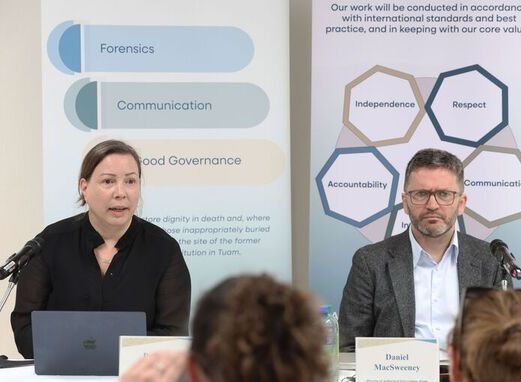Angel Desai in “All the Last Weekend,” by Honor Molloy.
By Peter McDermott
“Stay Home and Stay Safe.” Commissioned and presented by Origin Theatre Company. Plays by Geraldine Aron, Honor Molloy, Derek Murphy and Ursula Rani Sarma explore the topic of domestic violence during the pandemic. Cast: Angel Desai, Alan Kelly, Niamh Hopper, David Spain and Jade Jordan.
The vibrant Irish arts scene on the East Coast has had a couple of breakout stars into the mainstream, critically speaking, in recent times, Honor Molloy has been one, and you can see why with “All the Last Weekend,” the rawest and darkest of the four contributions to “Stay Home and Stay Safe,” which is being shown as part of the all-virtual 2021 1st Irish Theatre Festival (continuing through Jan. 31). For the central character, played by Angel Desai, love was everything; it was all she had to give. Molloy gets to the nub of the matter by ironically subverting the verb of the project’s title: “I stayed for him, stayed for myself, stayed for pride and I stayed for love. And I stayed for fear. I stayed …and I stayed for years.”

Playwright Honor Molloy. PHOTO BY VERA MAURA
Derek Murphy uses his trademark sense of humor to telling effect in “The Isolation of Mr. Moore.” The lockdown was going to be easier for the title character played by David Spain than most. “Sure I’ve been social distancing my entire life,” he says, and he’d been working from home anyway for two years. He prepared well, though, buying in all sorts of supplies, including every possible type of beans. “I got a pair of binoculars,” says Mr. Moore, who lives on the 5th floor, “just in case Netflix didn’t live up to the hype, which it doesn’t.”
Mr. Moore is a character from a Hitchcock film or Paul Auster’s fiction. There are possibly only two others living in the building, at least according to one of them. And there could be one or two victims, or maybe there are none. Murphy’s aim, it would appear, is to induce dread in the viewer as much as to create sympathy for the abused.

David Spain in “The Isolation of Mr. Moore,” by Derek Murphy.
In “Teresa’s Green,” Graham Heffernan (Alan Kelly), his friends call him Gray, is the only one of the four narrators who is not a victim and in control of his surroundings. An Irishman resident in London this past 25 years, he manages menswear in the “flagship branch of England’s most beloved department store.” If he had to have an epitaph, it would be “Fine design was his life.” He designed and made the wedding dresses for all four of his sisters, he tells us. There was an article in the Connaught Tribune about it. As it happens, Geraldine Aron’s is the most theatrical and most polished, design-wise, of the four plays here. And Gray is an engaging, serviceable character who you imagine could tell you about the lives of most others in his building. In this play, however, he’s focused on Craig and Celine on the 3rd floor just below him, who he helped move in some months before. He can tell their story because he can hear and even see some of its dramatic moments unfold, but also because of what is relayed directly to him by Celine in whispered conversations.

Alan Kelly in “Teresa’s Green,” by Geraldine Aron.
In a key moment in “Scarlett,” a small child is being bathed by her mother and it becomes clear she has inherited her grandfather’s instinct about people, or at least about one person in particular. Ursula Rani Sarma's play is the sparest of the four — it’s just Jade Jordan talking on screen, but it turns out in some ways to be the most sophisticated thematically. “Looking back now to the beginning, I can see what I took for romance was something else entirely,” Scarlett says.
Friday, Jan 22, 8 p.m., Tuesday, Jan. 26, 3 p.m. Tickets are free. Go to origintheatre.org for all ticket and festival details.
“Belfast 2050, Under the Albert Clock,” Directed by Rhiann Jeffrey. Cast: Maggie Cronin, Caroline Curran, Sarah Gordon, Abigail McGibbon and Sarah Reid. Presented by the Lyric Theatre.
Deep in the pandemic summer, the above-mentioned Derek Murphy suggested in the Irish Echo that radio was the new theatre. His own effort on YouTube, a comic series “Dial M for Mammy” (with David Spain in the cast), had its inspirations in radio theatre and soaps of past times, like “The Kennedys of Castleross,” which ran daily on Radio Eireann from the mid-1950s through the mid-1970s. It might be a good time to revive the radio play, in Murphy’s view, and short stories being read by actors, formats that heighten those senses used less when watching moving images.
With this in mind, the all-audio “Belfast 2050, Under the Albert Clock” appeared promising. Mostly, though, it’s a letdown. Origin commissioned "five of Northern Ireland's most dynamic female playwrights” — Alice Malseed, Fionnuala Kennedy, Gina Donnelly, Emily DeDakis and Sarah Gordon —to write a short play set in 2050 and inspired by Belfast’s Albert Clock. The works were given readings in New York early in 2020, while a different set of actors perform for this Lyric Theatre production. One of the five, Gordon’s “Occupied,” (which she performs herself), might work very well as a short radio play, and another, “The Garden of Remembrance for Bygone Phallic Symbols” by DeDakis, as a read short story. The rest cry out for interaction between the actor/monologuist and an audience.

The Albert Clock in Belfast. PHOTO BY STANISLAV NIKOLOV
It’s not that there isn’t terrific writing in each play, but the writers’ imaginations seem weighted down by the clock, the city’s history and its current concerns. Only DeDakis, who is from the U.S. originally, seriously takes on the future, with the help of a darkly comic alternative reality. She relocates the Albert Clock to eastern Colorado; the play is freed from local obsessions, and the writer able to make her universal point, via an absurd international campaign.
Monday, Jan. 25, 3 p.m. Tickets at $10. Go to origintheatre.org for all ticket and festival details.









